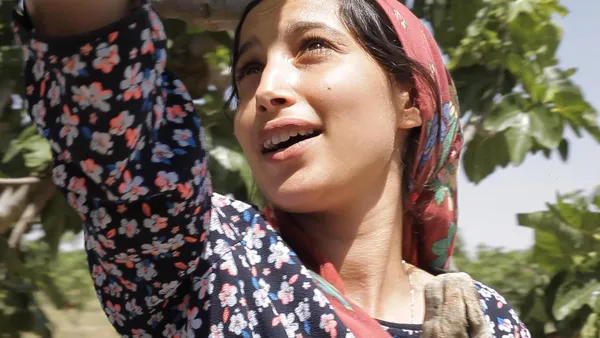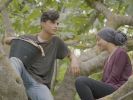Eye For Film >> Movies >> Under The Fig Trees (2021) Film Review
Under The Fig Trees
Reviewed by: Andrew Robertson

Across the permeable border of day she walks. We don't have enough geography to know that it's east, cock crow as compass as much as clock. Against and between that boundary, the dark of body against the light of sky. Orange and not yet blue and the sweep of hills.
In that golden hour they wait for the truck marked SABER, the man they will for today and again perhaps call boss. The first words "she took everything and left" and there are ambitions and lamentations both within it. In the morning not yet broken they gulp a glass of coffee, small and strong as any of those who will perch and carp in the bed of that conveyance.

To the orchard. Along roads that wind and wind, meanders that would demand a slowness to catch one's breath. Close-ups of the faces, heads scarved and colours that feel both bright and muted like a fanfare of cautious trumpets. The score a first moment of music, usually sound of the landscape, the rhythms of engines the rustles of leaves. In these sculpted faces of workers young and old I had a thought of Soviet Realism, some level of pastoral propaganda layering its artificialities.
The figs do not care. Their flesh is hard or soft according to their calendars. Their branches will bend but only as far as wood and weather will warrant. Their leaves will flatten with a cut to pad the hard and faded plastic of the crates. Wide and solid and as structured as our framing.
A collision of modernity, "like the first person to fall in love" after the dragon smoke of some species of vape. Wondering what smells sweeter on the hillside, candy-floss suspended in water-vapour or the ripening figs dappled beneath that leaf-strewn sun. Sweat on the brows of of the workers, gloss on the lips of the gossipers. "A lot of things happen in orchards", "You can't trust them".
Erige Sehiri has several documentary shorts, a documentary feature (2018's Railway Men), and this her first fiction film. Though fiction isn't doing much lifting, and I say that not as an unkindness. "Is there another girl?", "See you at the Aziza [supermarket]", "It's cold by the yogurts". I quote not for the sense of the quotidian but for the rattle of the humdrum. She co-writes here with Peggy Hamann and Ghalya Lacroix, the latter perhaps best known for Blue Is the Warmest Colour. Here too life and love, food and foliage.
Taht el Karmouss is 'Under The Figs' but the synechdoche of fruit and tree requires a certain closeness. In the arbour, ardour. Stories within stories, the relative awkwardness of Bollywood being inappropriate, the aches and pains of age. Still water, still waiting. Call and response, call to prayer, call of phone. Plucked strings post-prandial, moments where consideration is made imperative. "There's nothing going on here" and it is and is at once not true.
Frida Marzouk's camerawork belies that this is, as far as I can tell, a first feature as a director of photography. Though often credited in electrical roles, on productions as varied as Black Swan, John Wick, and Capernaum, the line between document and documentary is carefully threaded. The sense of observation without interpolation is a difficult one, especially in a medium so given to falsity as film, but this never feels off. Amin Bouhafa's score brings perhaps the most significant layers of artificiality, and even then it feels less lie than another lens. This project part of a big year for the composer, also Gagarine and The Man Who Sold His Skin. Here far more grounded, literally so, rooted in a place green with the growing figs. A terroir to the drama and scandals whose content is less fantastic than Facebook, less astral than pastoral, It is not that there are no villains, only the village. People bring people with them. The eagle and the star might both be a symbol of projected power but they are ones chosen by men. The fruit that falls from the trees is controlled and concealed. The dispossessed, the distant, the law and the land.
In poster and publicity it is described as a fiction film project and it has the feel of something devised, derived from the lives of an amateur cast. "You can barely see it" "but it's still there". One learns to see the signs, the characters who share their names with the cast, but perhaps not wholly so. A minimalism to it all, a simplicity that speaks not of a lack of sophistication but of a commitment to form, to feel. We see faces closely enough to wonder, wandering with them hand held through groves. The stories that bloom here are rooted in the real, jacketed in the bruised flesh of familiar harms. The careful leaves cannot shelter one person from another. Around different leaves, differently cared for, tea and sympathy and their corresponding lacks do contrasting quantuum of comfort provide.
The song sung as they sip is untranslated. The tears do not need to be. There is an edge to woodwinds sometimes, a fierceness to the flute. God avenges, forgives, gives strength. Breath forced forth and shaped with separate dexterities to make something beautiful. Under the Fig Trees the same. It's not the first but the subsequent moment that creates rhythm, melody, counter-melody. Action and reaction and onwards. Questions of rent, of wages, of what is just, of rewards.
The chatter of makeup and mirrors is untranslated. The looks do not need to be. The score a third time a contrast to the imminent scrape of crate on loadbed, the integer geometry of overlapping supply chains. It's not that way, it's the other. God be with you. Labour secured by different means, the bright blue of baling twine and the solid slide of bolt. Under the Fig Trees the same. It's not the shutting but the locking that creates certainty, ending, opportunity. It's not the shutting of the eyes but the looking that creates certainty, ending, opportunity. Song and smile and onwards. Clapping and clasping of hands, song giving way to something more orchestral than organic. In that cycle other stories, any number of other songs.
Nour Arjour's cover of Dima Dima plays over the credits, a further moment of reflection. I'll steal my closing words from a translation of those as they work for the film as well. "And water your plants with tears in my eyes, No matter how much you betray me, you are dear to me".
Reviewed on: 21 May 2022
















